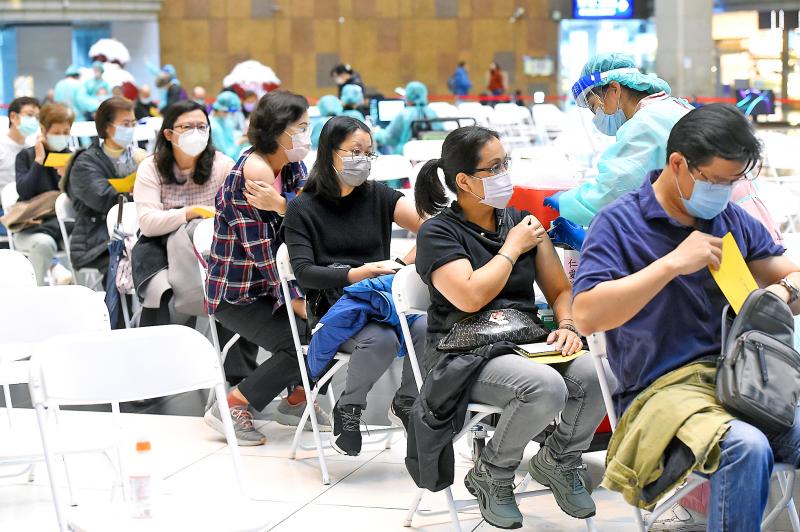Medigen Vaccine Biologics Corp (高端疫苗) yesterday reported higher neutralizing antibody levels in people who were given its COVID-19 vaccine as a booster after two AstraZeneca doses, the company said.
In a trial of 200 participants who received Medigen’s COVID-19 vaccine, neutralizing antibodies against the Omicron variant of SARS-CoV-2 grew by 5.7 times one month after being administered, Taoyuan General Hospital said.
Medigen said that the results have been submitted to medRxiv, an online platform for researchers to share complete but unpublished papers.

Photo: Chu Pei-hsiung, Taipei Times
Another trial conducted by National Taiwan University Hospital showed that among 45 participants who received three doses of the Medigen vaccine, the level of neutralizing antibodies against the Omicron variant gradually fell, similar to those who received three doses of mRNA COVID-19 vaccines such as those made by Pfizer-BionNTech and Moderna Inc.
“This result indicates that our vaccine, as a booster shot, provided protection against the Omicron variant to some degree,” Medigen said.
The company said that people who have received adenovirus-based vaccines, such as the one made by AstraZeneca, or mRNA-based vaccines could consider taking the Medigen vaccine as a third shot given its safety profile, mild side effects and immunogenicity.
Medigen’s vaccine is a protein subunit vaccine, developed by recombinant technology. It comprises the recombinant spike protein of SARS-CoV-2 as the antigen to help a person’s body recognize the virus if a person becomes infected.
The company said that it would recruit 960 participants for a “mix-and-match” clinical trial in which it plans to test the safety and immunogenicity of different combinations of multiple brands of COVID-19 vaccines.
Medigen has received a subsidy of US$2.3 million from the Coalition for Epidemic Preparedness Innovations, an international foundation, to conduct the trial.
The trial is to be carried out in four hospitals, and recruitment of participants has begun, it said.
As of Sunday, 1.51 million people had received two doses of Medigen’s vaccine, accounting for four percent of 36.17 million who had received two COVID-19 shots, while 112,838 people had chosen the vaccine as booster shot, Centers for Disease Control data showed.

Enhanced tax credits that have helped reduce the cost of health insurance for the vast majority of US Affordable Care Act enrollees expired on Jan.1, cementing higher health costs for millions of Americans at the start of the new year. Democrats forced a 43-day US government shutdown over the issue. Moderate Republicans called for a solution to save their political aspirations this year. US President Donald Trump floated a way out, only to back off after conservative backlash. In the end, no one’s efforts were enough to save the subsidies before their expiration date. A US House of Representatives vote

Nvidia Corp chief executive officer Jensen Huang (黃仁勳) on Monday introduced the company’s latest supercomputer platform, featuring six new chips made by Taiwan Semiconductor Manufacturing Co (TSMC, 台積電), saying that it is now “in full production.” “If Vera Rubin is going to be in time for this year, it must be in production by now, and so, today I can tell you that Vera Rubin is in full production,” Huang said during his keynote speech at CES in Las Vegas. The rollout of six concurrent chips for Vera Rubin — the company’s next-generation artificial intelligence (AI) computing platform — marks a strategic

REVENUE PERFORMANCE: Cloud and network products, and electronic components saw strong increases, while smart consumer electronics and computing products fell Hon Hai Precision Industry Co (鴻海精密) yesterday posted 26.51 percent quarterly growth in revenue for last quarter to NT$2.6 trillion (US$82.44 billion), the strongest on record for the period and above expectations, but the company forecast a slight revenue dip this quarter due to seasonal factors. On an annual basis, revenue last quarter grew 22.07 percent, the company said. Analysts on average estimated about NT$2.4 trillion increase. Hon Hai, which assembles servers for Nvidia Corp and iPhones for Apple Inc, is expanding its capacity in the US, adding artificial intelligence (AI) server production in Wisconsin and Texas, where it operates established campuses. This

US President Donald Trump on Friday blocked US photonics firm HieFo Corp’s US$3 million acquisition of assets in New Jersey-based aerospace and defense specialist Emcore Corp, citing national security and China-related concerns. In an order released by the White House, Trump said HieFo was “controlled by a citizen of the People’s Republic of China” and that its 2024 acquisition of Emcore’s businesses led the US president to believe that it might “take action that threatens to impair the national security of the United States.” The order did not name the person or detail Trump’s concerns. “The Transaction is hereby prohibited,”